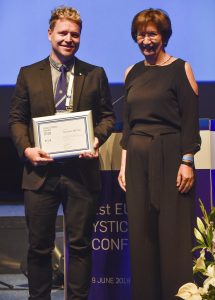Proof that Mycobacterium Abscessus Doesn’t Always Lead to Transplant Failure

Part two of a series. Read part one.
Last week, I wrote about how disheartened I felt that many lung transplant centers refuse to help cystic fibrosis patients with Mycobacterium abscessus complex (Myco Ab), which is a species of nontuberculous mycobacteria (NTM). Myco Ab makes transplant difficult, but not impossible.
I aim to establish both that Myco Ab patients can be successfully transplanted, and that transplant centers need to figure out their policies regarding transplanting patients with the bug.
Today, I want to shift from my perspective to those of researchers in the NTM and lung transplant fields. I’m going to make this simple, straight to the point. Below, I summarize a few studies, then I present excerpts from an interview I had with Dr. Tavs Qvist on June 8 at the 2018 European Cystic Fibrosis Conference in Belgrade, Serbia.
First, a note: Many of these studies are broad overviews from the past several years, so it’s important to note that detailed, effective protocol for treating Myco Ab didn’t get published until 2015. We now have better methods of fighting the superbacterium, and more cool treatments, like nitric oxide, are on their way.
The studies
“Mycobacterium abscessus and Lung Transplantation: An International Survey”
This survey of 47 transplant centers found that 16.2 percent of teams were unsure if Myco Ab was a contraindication to lung transplant, 11 percent had no opinion, and 18.9 percent considered it a contraindication. Respondents say 72.2 percent of post-transplant patients were alive one year after infection. (Benchmark survival rates for all lung transplant patients in the U.S. are 88 percent at one year post-surgery.)
“Lung transplantation in patients with cystic fibrosis and Mycobacterium abscessus infection”
A lung transplant center transplanted four patients who had both CF and Myco Ab. The first three had skin abscesses and infection. At one, three, five, and seven years post-transplant, respectively, none of the patients had evidence of chronic rejection or Myco Ab.
“NonTuberculous Mycobacteria infection and lung transplantation in cystic fibrosis: A worldwide survey of clinical practice”
This survey of 21 centers found that only 29 percent of transplant centers had a written policy regarding transplanting with NTM. The study’s abstract concludes: “The issue of NonTuberculous Mycobacteria infection in people with cystic fibrosis requiring lung transplantation is well-recognized however current international recommendations are not detailed and there is variation in practice between centres. There is an urgent requirement for high quality clinical data to inform decision-making.”
“Nontuberculous Mycobacterial Disease Is Not a Contraindication to Lung Transplantation in Patients With Cystic Fibrosis: A Retrospective Analysis in a Danish Patient Population”
This Danish study led by Dr. Qvist acknowledges that NTM’s status as a potential contradiction to transplant is debated. Nine of the 52 lung transplantees at the center (17 percent) had NTM at some point. Of those, five had known infection at the time of transplant. Two died of non-NTM causes, two developed Myco Ab wound infections (Myco Ab is sometimes found in wounds, not just the lungs), and one tested positive for Myco Ab in their lungs. One patient was cured and the other two remained on long-term treatment and remained stable in lung function. The study remarks that transplanting with NTM is feasible but complications are expected.
Is there ever a lung transplant in which complications aren’t expected?
Also, review again my last column, in which I speak about the University of California, San Francisco’s recent study. They transplanted six patients with Myco Ab. One died from causes unrelated to NTM, the others, including me, are doing fine today.
Turning over the mic to Dr. Qvist.
Dr. Tavs Qvist
“My point about transplantation and Mycobacterium abscessus is that it is feasible, and even though there are complications — some of my patients saw soft tissue infections — they were manageable,” Dr. Qvist said. “It was just difficult and took some time to treat but it wasn’t lethal problems. It required a really long time of IVs, but it worked out. It’s all about having a team who’s up for the challenge. It shouldn’t only be cases where the patient is already in your care and you’re familiar, so you make an exception.”
Dr. Qvist advocates testing much more frequently for NTM in patients, both before and after lung transplantation, to catch the superbacterium earlier. He also says patients should be treated up to 18 months with antibiotics after transplant to ensure the Myco Ab stays suppressed or eradicated.
He said he understands the hesitation by transplant centers: “There’s a shortage of organs so, ethically, doctors choose cases with the best chances of success.”
“It’s really the lack of organs, that’s the real issue. But I think we need to keep an open mind that this can be managed and shouldn’t be a contraindication,” he said.
Dr. Qvist also mentioned that he believes Myco Ab shouldn’t always affect lung allocation scores (an estimate of lung candidates’ medical urgency and expected post-transplant survival rate relative to other patients on a lung transplant waitlist), though he could envision certain situations where it would.
“I think, in the U.S., [Mycobacterium] abscessus, is proving to be a real problem and there’s going to be a delay [in protocol], and transplant doctors will stand with a real problem: ‘Are we really going to deny all these patients transplantation?’”
***
Note: Cystic Fibrosis News Today is strictly a news and information website about the disease. It does not provide medical advice, diagnosis, or treatment. This content is not intended to be a substitute for professional medical advice, diagnosis, or treatment. Always seek the advice of your physician or other qualified health provider with any questions you may have regarding a medical condition. Never disregard professional medical advice or delay in seeking it because of something you have read on this website. The opinions expressed in this column are not those of Cystic Fibrosis News Today, or its parent company, Bionews Services, and are intended to spark discussion about issues pertaining to cystic fibrosis.











Leave a comment
Fill in the required fields to post. Your email address will not be published.